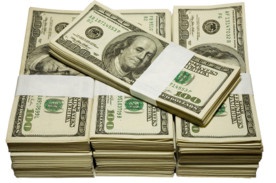The European Union says it is willing to scrap the estimated US$4billion it injects annually into encouraging exports of its agricultural and dairy products, if America and others commit to the same.
The US government is also said to have in recent years made annual outlays of over US$1billion in its agricultural Export Enhancement Programme (EEP) and its Dairy Export Incentive Programme (DEIP).
At a discussion in Accra on agricultural development in Ghana, the visiting EU Commissioner for Agriculture and Rural Development, Dacian Ciolos, said the commission realises that it cannot support Africa with one hand through its development fund and, on the other hand, hamper Africa’s agriculture through unfair trade practices.
“We want to use this as an instrument of negotiation with other partners in the world who use the subsidies, and we want to ask them to also renounce this instrument which can affect your (Africa) market or your development. So, if in another Doha Round or another multilateral negotiation, we get the US and other partners to renounce the instrument, we are also ready formally to renounce it,” the commissioner said.
Asked why the EU would only remove the subsidies when others do so, Mr. Ciolos said his side is not convinced that the others will follow suit if it goes ahead to remove the subsidies.
“We think that in a multilateral negotiation we have to use this kind of instrument to obtain broad support for the removal of the subsidies. In football, we call this offside. If you go faster and you are alone, you obtain nothing,” he said.
The EU, he added, is finalising its report on a Common Agricultural Policy for the 28-member regional body, and that they have decided not to include the export subsidies in the policy, which will be implemented from January 1, 2014.
“We have now in Europe a more market-oriented agriculture...Our market measures are more and more market-oriented,” he said.
Africa, one of the key trading partners of the EU, has often complained about the negative impact of EU subsidies on its already anguished agriculture. Cheap poultry imports from the EU and other markets have effectively wiped out the industry in many African countries, including Ghana.
Reacting to the matter, Philip Abayori, President of the National Farmers and Fishermen Award Winners Association of Ghana, said EU agricultural subsidies put African farmers in “a disadvantaged position”.
“So If they can remove their export subsidies before fully engaging with us under any agreement, what it would mean is that our production costs may be the same, or it will at least increase their costs for us to have competitiveness. But if they continue to have production and export subsidies, it means they are subsidising the value-chain, and we are not; so it puts us at a disadvantage,” he told the B&FT.
The EU has been trying to create a free trade area with the African, Caribbean and Pacific Group of States (ACP) -- through the Economic Partnership Agreements (EPAs) -- as a response to continuing criticism that the non-reciprocal and discriminating preferential trade agreements it offers to the ACP are incompatible with World Trade Organisation (WTO) rules.
The WTO, which deals with the global rules of trade between nations, prohibits most subsidies directly linked to the volume of exports.
Business News of Monday, 7 October 2013
Source: B&FT
EU to scrap export subsidies ...if others join













